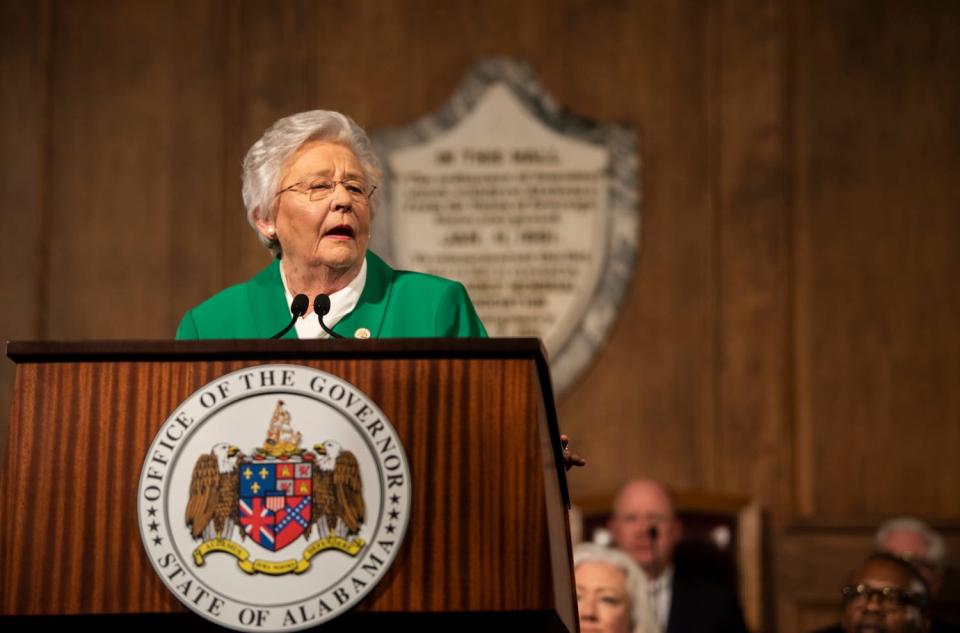Gov. Kay Ivey’s office hires Montgomery law firm in death penalty case
- Oops!Something went wrong.Please try again later.
Gov. Kay Ivey’s office has signed a $100,000 contract with a Montgomery law firm to defend the office against a lawsuit brought by the family of a man executed by the state last year.
The Legislature’s Contract Review Committee Thursday approved the contract, worth about $195 an hour.
The committee asked for a clarification on the start date of the contract. Sen. Dan Roberts, R-Mountain Brook, told reporters after the meeting that he was told it was May 25.
“I’m assuming that’s last year,” he said.
The lawsuit was brought by the family and estate of Joe Nathan James Jr., sentenced to death for the murder of his ex-girlfriend, Faith Hall, was executed on July 30, 2022. Hall’s family opposed his execution.
James’ execution was delayed by about three hours, and media witnesses admitted into a chamber to view the execution said that he appeared unconscious and had his eyes closed. Inmates are usually conscious at the start of an execution and given the opportunity to say last words.
Alabama Department of Corrections Commissioner John Hamm told reporters that James was not sedated but could not confirm consciousness. ADOC denied a records request for James’s execution records.

The governor’s office said in a statement Thursday that it planned to “defend our duty to the law and upholding justice.” Messages seeking comment were left Thursday with Arnold & Porter, a law firm representing the plaintiffs.
Hakim James, Joe Nathan James’ brother and a plaintiff in this case, allowed The Atlantic to witness an autopsy of his brother. Joel Zivot, who attended the autopsy, concluded that James likely suffered a long death and said it likely included a “cutdown,” where veins are exposed in attempts to make it easier for execution staff to see.
The use of a local anesthetic was unclear, according to Zivot. James also had injuries that indicated movement while setting the IV, said Mark Edgar, a pathologist at the Department of Laboratory Medicine and Pathology at the Mayo Clinic in Jacksonville, Fla., who reviewed photos.
The lawsuit alleges that the state violated James’ Eighth Amendment protections against cruel and unusual punishment, and his 14th Amendment guarantees of due process.
“The facts available demonstrate that Defendants unconstitutionally subjected Mr. James to excessive pain during his prolonged execution and deprived him of the right to be conscious and speak his final words before the administration of the lethal drugs,” the complaint said.
The filing says that the time taken in the execution far exceeded the time needed by a “competent team” to set two IVs.
The lawsuit also cites Alabama’s record of botched executions. In 2018, the state called off the execution of Doyle Lee Hamm after execution staff could not find a suitable vein. Hamm’s attorneys alleged Hamm began bleeding on the gurney. The state and Hamm’s attorneys later reached an agreement to not attempt a second execution. Hamm died of cancer in 2021.
The lawsuit also cites the attempted executions of Alan Eugene Miller and Kenneth Smith, whose scheduled executions were called off later in 2022 after repeated attempts to establish IV lines in the men’s veins.
“Unfortunately for Mr. James, ADOC’s recognition of the flaws in its execution procedures — and the resulting unlawful pain and suffering and deprivation of rights — came too late,” said the filing.
In a July 3 filing, attorneys for the state argued that Alabama has qualified immunity on the claims, and that the plaintiffs lack standing because James’ claims did not survive him.
Attorneys for the state said in a footnote in the filing that the plaintiffs’ claims had been discredited, citing an affidavit from Dr. Boris Datnow.
“Dr. Boris Datnow noted ‘no signs of a struggle, no excessive bruising beyond that typically found with intravenous access, no signs of excessive needle punctures, and no signs of torture or other abuse’ as well as ‘[n]othing, that ‘suggested that Mr. James had been administered an intramuscular sedative,’” lawyers for the attorney general’s office wrote.
The state says that a tort action cannot be brought by a personal representative other than wrongful death, which impacts three of the plaintiffs claims. The state also says that wrongful death can only be brought if it is the cause of death, and the planned execution was James’s cause of death.
“Taken together, these rules show that plaintiff cannot bring the claims alleged in the Complaint,” wrote the attorney general’s office lawyers.
On July 10, Stephen M. Doyle, chief U.S. magistrate judge, ordered the plaintiff to show cause by July 31. On July 12, the plaintiff’s lawyer requested an extension until Aug. 17, which was granted by Doyle.
The case was reassigned to Judge Emily C. Marks on July 31.
Alabama Reflector is part of States Newsroom, an independent nonprofit website covering politics and policy in state capitals around the nation.
This article originally appeared on Montgomery Advertiser: Gov. Kay Ivey’s office hires Montgomery law firm in death penalty case

